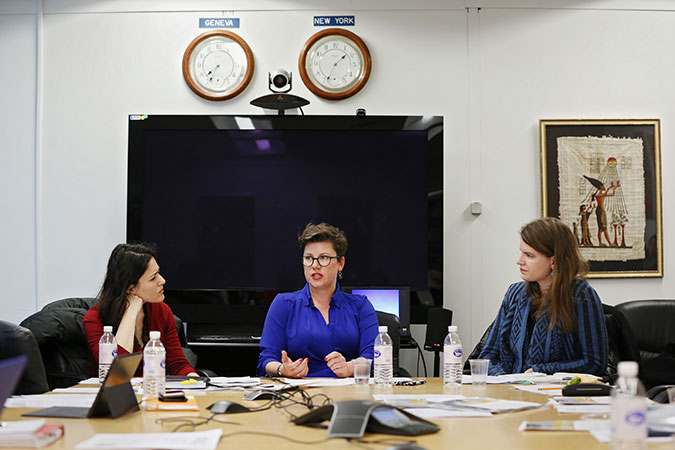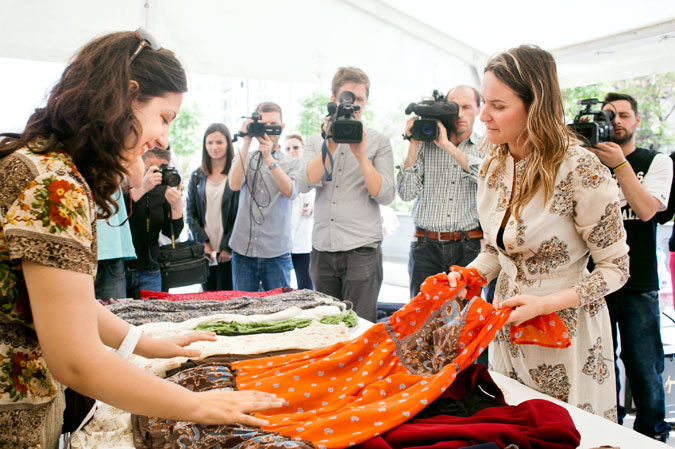Path to justice for survivors of Kosovo’s sexual violence: Q&A with Siobhan Hobbs
Date:

During the armed conflict of 1998 – 1999 in Kosovo*, an untold number of women experienced systematically organized sexual violence. Siobhan Hobbs, Gender Adviser with UN Women’s Project Office in Kosovo, is working on a programme with the National Council for Survivors of Sexual Violence, the government of Kosovo and survivors of conflict-related violence, to facilitate reparations for the survivors. She recently spoke to Christine Chung of Women & Girls Hub about the process of reparations. “The Conflict Did Not Bring Us Flowers”, a UN Women report on survivor perspectives and recommendations for comprehensive reparations for conflict-related sexual violence in Kosovo, authored by her, will be published on 31 August.
Can you explain the background to the conflict-related sexual violence in Kosovo?
Siobhan Hobbs: During the conflict, reports of men and women being separated were common. Sexual violence occurred in the lead-up to, during and after the armed hostilities in Kosovo. A large number of people were sexually violated; the exact number is unknown, because there was not a lot of documentation at the time. Those survivors of sexual violence have as yet to receive any sort of formal recognition or reparations.
The National Council for Survivors of Sexual Violence was set up by the fourth President of Kosovo, Atifete Jahjaga, in 2012. It brought together a cross-section of ministerial and civil society representatives, and helped to pull them under one banner. President Jahjaga was quite involved in bringing a lot of international support, but also showing state support to the survivors.
Women & Girls Hub: What is the reparations programme?
Hobbs: A number of efforts have been made to establish a reparations programme for survivors of conflict-related sexual violence. Primary and secondary legislation was passed that provides for a commission to be established that will verify the status and recognize survivors of sexual violence. As yet, the reparations programme that has been designed by the legislation has not been implemented. But movements are under way to establish the commission and we’re hopeful that will happen by the end of this year.
Women & Girls Hub: How common is it around the world that survivors of sexual violence in conflict receive recognition and reparations?
Hobbs: It’s fair to say that sexual violence has existed probably in every war to date, but it hasn’t been recognized. The Balkan wars were the turning point, and particularly the conflict in Bosnia. In terms of designing reparations programmes, it’s still in its infancy… Several countries have designed either specific or more general frameworks, in which survivors of sexual violence can receive benefits, but they’ve been implemented to varying degrees and have had varying levels of success.
In 2014, the UN Secretary-General developed the Guidance Note on Reparations for Sexual Violence. That was really an attempt by the head of the UN to pool together the lessons learned, not just from the specific field of sexual violence, but also from reparations in general.
Women & Girls Hub: What progress has been made to date in Kosovo?
Hobbs: A lot of progress has been made, and much is attributable to [former] President Jahjaga, both by bringing it to the political level and as a state representative going back out to the community level, recognizing and meeting with survivors, making them feel like they matter, that this cause will be taken up on their behalf.
I’ve met with a lot of survivors over the past year. Most of them tell stories about how it felt when they first met [former] President Jahjaga, about how either it was life-changing or certainly made them feel more empowered. If she was going to pick up the cause, they could continue to fight themselves. In some instances, survivors noted that the President being a woman, in their minds, enabled this to happen, that she somehow understood their suffering.
There are also male survivors of sexual violence in Kosovo, but as yet, there are not many services dedicated to supporting them and there haven’t been as many reports. The majority of people that are accounted for, at least through civil society organizations, are female survivors of sexual violence, and they are all adults now.

Women & Girls Hub: What types of services have been provided to survivors?
Hobbs: People are pretty ingenious about trying to meet their own needs and those of the people around them who are in need of care. Some of the women’s groups, particularly those that operated during and after the war, were providing urgent medical assistance and sexual and reproductive healthcare needs. Some of them facilitated statement-taking or linking with police or other authorities, for criminal justice mechanisms.
These days, there are about four organizations mainly focused on psycho-social healthcare. Some have started small-grant economic empowerment projects, setting up cooperatives, trying to organize free training for some of the survivors. The issue of stigma is really huge in Kosovo, as in most areas. Many survivors fear being rejected by their families or have in some way been shunned by them or society, so accessing employment opportunities has been particularly difficult.
Women & Girls Hub: You mentioned taking statements or linking with authorities. How do reparations intersect with criminal justice action on the sexual violence?
Hobbs: UN Women also supports an access to justice programme in Kosovo. When the National Council for Survivors of Sexual Violence was formed, it was one of the four areas of the Council’s focus, so a national access to justiceplan was developed and is being implemented. It’s probably the area where there has been the most progress, certainly in terms of providing physical access to criminal justice mechanisms, training for representatives in criminal justice mechanisms.
But in terms of cases, there haven’t been that many, and it’s unlikely that there will be a large number, given the political climate, the location of alleged perpetrators and the public nature of proceedings. Therefore, survivors who don’t wish to be identified would be more reluctant to engage in the processes.
This interview originally appeared in Women & Girls Hub, NewsDeeply, on 4 August, 2016 and has been adapted for this website.
* References to Kosovo shall be understood to be in the context of Security Council Resolution 1244 (1999)